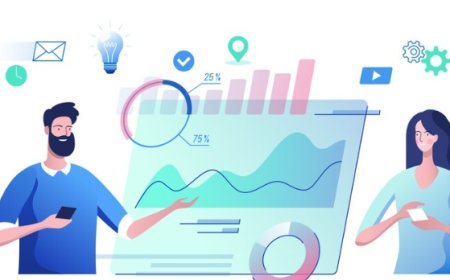How HR Analytics is Transforming Talent Management Strategies
Explore how HR analytics is reshaping talent management strategies. Discover the power of data-driven insights for informed decisions in recruitment, development, and retention.

Talent management plays a pivotal role in organizational success. Companies are going through a competitive scenario where attracting, developing, and retaining top talent is crucial for sustained growth. The integration of HR analytics has become a keystone in this situation, offering organizations valuable insights into workforce dynamics, employee performance, and strategic decision-making.
As businesses strive to optimize their human capital, HR analytics emerges as a transformative tool, enabling evident based approaches to talent management, ultimately shaping the future of organizational success.
Difficulties faced by traditional talent management strategies.
-
Limited Data Insights: Traditional talent management relies on subjective assessments, lacking the depth provided by HR analytics tools that offer data-driven insights.
-
Ineffective Decision-Making: Without the aid of predictive analytics, HR decisions may lack foresight, hindering the ability to strategically plan for talent needs.
-
Scattered Employee Development: Traditional methods often struggle to identify precise areas for employee growth, while HR analytics pinpoints specific skills gaps for targeted development.
-
Retention Blind Spots: Traditional approaches may miss subtle signs of employee dissatisfaction, while HR analytics can detect patterns contributing to turnover, aiding in proactive retention strategies.
-
Bias in Evaluation: Human biases can impact talent decisions, whereas HR analytics mitigates bias by focusing on objective data and measurable performance metrics.
-
Inefficient Recruitment: Traditional recruitment methods may overlook potential hires, whereas HR analytics streamlines the process, ensuring a more comprehensive and data-driven candidate search.
-
Lack of Adaptability: Traditional strategies may struggle to adapt to changing workforce dynamics, while HR analytics allows for agile adjustments based on real-time data insights.
-
Absence of Continuous Monitoring: Traditional performance evaluations are periodic, missing ongoing feedback, whereas HR analytics enables continuous monitoring for timely intervention and improvement.
-
Limited Succession Planning: Without predictive analytics, identifying and nurturing future leaders becomes challenging, impacting long-term organizational resilience.
-
Inadequate Talent Alignment: Traditional methods may not align employee skills with evolving business needs, while HR analytics ensures a dynamic match between talent and organizational goals.
The growing complexity in managing diverse and global teams.
Handling diverse and global teams presents a challenge for HR analysts. The increasing complexity stems from varied cultural nuances, time zones, and communication styles. HR analytics emerges as a vital tool in navigating this intricacy. By utilizing analytics, we can track performance metrics, identify cross-cultural collaboration opportunities, and tailor HR strategies to the unique needs of diverse teams. Metrics like employee engagement, cultural fit, and performance indicators play a key role.
Can HR analytics serve as a transformative solution to the constraints posed by traditional talent management methods? By looking into key metrics and data points, can organizations unlock the potential for more effective talent management strategies? Does the integration of HR analytics empower decision-makers in talent acquisition, development, and retention, providing them with the insights needed to make informed and strategic choices?
HR Analytics Transforming Traditional Talent Management
Traditional ways of managing talents sometimes feel like obstructing. But here comes HR analytics, a super-smart solution that's changing how we handle our teams. With HR analytics, we use data to make really smart decisions about our people. It helps us deal with all the complicated stuff at work. We can predict who's going to do great and fix any problems with how people are doing their jobs. Choosing HR analytics isn't just a good idea; it's something we really need in today's HR world. Imagine a future where handling talent is super easy.
Key Metrics and Data Points Revolutionize Talent Management
Making talent management easier is possible with smart use of HR analytics. By paying attention to important numbers like how well employees are doing, how engaged they are, and how many stick around, companies get really useful information. These details show the way to finding people with a lot of potential, spots that need improvement, and using resources better. Predictive analytics, a big part of HR strategies, helps get ready for the future by planning for new talent and growth. Using this info-driven method helps companies make smart choices, making talent management more flexible and successful. Use HR analytics to boost your company and make talent management smoother.
Strategic HR Decisions with Analytics
Using analytics is crucial for making smart decisions about hiring, growing, and keeping employees. HR analytics gives real and clear insights, helping decision-makers handle workforce challenges easily. By looking at important performance signs and using predictive analytics, HR folks can find the best employees, create programs for their growth, and improve how we keep them in the company. This mix lets HR teams make smart choices early on and plan for the future, creating a strong and happy workforce.Taking up HR analytics isn't just a rage, it's a powerful tool that helps HR analysts shape a talent management future that's ready for anything.
When we use HR analytics, it's like having a secret weapon that changes how we handle finding and keeping great employees. It helps us make smart choices that match what the company wants to achieve. Imagine going on a journey into predictive analytics, where we explore important facts about our employees, like what they're good at and where they can grow. By using data to hire, train, and keep our team, we make everything work better and smoother. So, let's be part of this HR analytics adventure, making talent management super effective and precise. It's time to use data power for a better HR future!











































